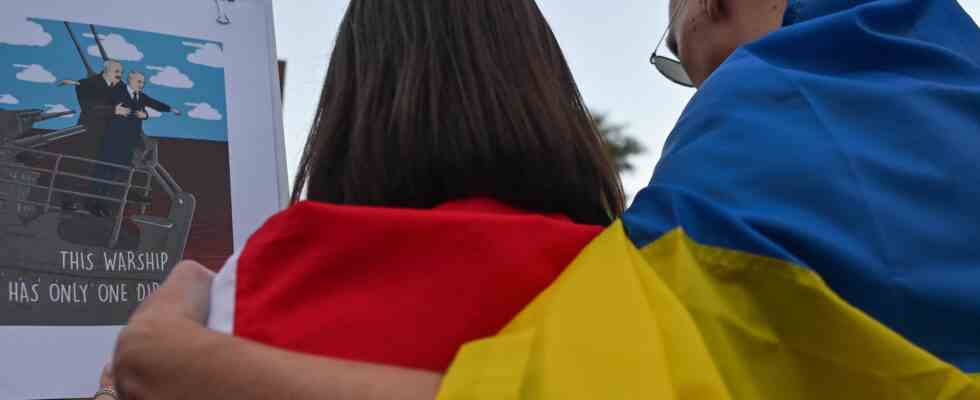comment
Status: 07.10.2022 15:07
With this year’s Nobel Peace Prize winners, the committee is sending a strong signal against the post-Soviet imperialism of the Kremlin: because the destinies of peace and freedom of the three peoples are inextricably linked.
“Long live Belarus!” – “Glory to Ukraine!” – “Russia will be free!”. It is no coincidence that the participants in protests in the three countries often shout these slogans together: behind this is not just a sign of mutual solidarity, but also the awareness that the peoples of these countries are inextricably linked in the fight for civil liberties and human rights.
The fact that the Nobel Peace Prize Committee is not awarding the prize to one, but to three important actors this year, reflects this bond – and sends an important signal against the post-Soviet imperialism of the Kremlin.
Because those fighting oppression in Belarus, Russia and Ukraine attribute their suffering to a common enemy: Kremlin chief Vladimir Putin. He wants to rebuild a kind of Soviet Union of the 21st century by suppressing any contradiction and his historical revisionist imperialism. Large parts of the population in the three states no longer want to support a totalitarian solidarity by Moscow’s grace, which is based on dependence on the Kremlin – and are fighting back together.
Belarus’ struggle for freedom
When, after the massive election fraud of 2020 and more than two and a half decades of totalitarian rule by Alexander Lukashenko, masses of Belarusians took to the streets to protest, he had his security apparatus brutally unleashed against his own population. Opposition leaders such as Svetlana Tichanovskaya and Maria Kolesnikova are still in prison or were forced into exile, animal protection organizations and writers’ clubs were dissolved, and journalists and lawyers were prevented from working. Prizewinner Ales Bjalyazki is in prison on the day he was honored.
In order to stay in power, Lukashenko put himself in the service of Putin – and almost gave up his state’s sovereignty. As a result, masses of Russian soldiers and military equipment have been brought to Belarus and have been using the infrastructure there to attack Ukraine from February.
Many Belarusian opposition figures had found refuge from the regime in Ukraine, but now they have become homeless again during the war. Many have volunteered to join the fighters in Ukraine under the white-red-white flag, while Lukashenko threatens that he reserves the right to mobilize and thus officially enter the war – the concern among the population is correspondingly high that Ukraine will soon Belarusians have to shoot at Belarusians.
Ukraine’s struggle for existence
For Ukraine, its existence as a sovereign country is at stake in a completely different way: the Kremlin repeatedly denies the Ukrainians their independence as a state and people, preferring to wipe them out militarily, as state propaganda stations in Russia repeat incessantly. To achieve this presumptuous goal, he also bombs the civilian population and uses the threat of a nuclear explosion as leverage.
But while Ukrainians have been defending themselves against the Russian attack for months – thanks in part to the support of powerful friends in the West – open resistance is hardly possible in Russia. For many years now, the Kremlin has been gradually unplugging independent news media in its own country pulled, all political opposition and numerous civil society associations were persecuted.
The bitter crackdown on the Nobel Peace Prize organization Memorial, whose decades of work refutes his view of history, is a symbol of his wish: to make any contradiction and orientation to historical facts instead of political doctrines impossible.
Real connection instead of compulsion
The fact that Russia’s civilian population does not know how to help itself other than by fleeing the country en masse – “as long as it is still possible,” as many say – shows how far the learned helplessness has progressed there. Those who can and want to resist Putin’s claim to omnipotence find strength in supporting aid organizations for Ukraine and Belarus – and in doing so are showing their intellectual and moral independence.
Today, on Putin’s 70th birthday, the applause and joy of many Russians is not for the head of the Kremlin, but for Ales Byalyatski and the organization he co-founded, “Vyazna”, Memorial and the Ukrainian Center for Civil Liberties: you post with applause the Decision of the Nobel Prize Committee, share appeals for donations – or write pointedly: “All my friends are Nobel Prize winners”.
The Nobel Peace Prize has succeeded in what Putin will never achieve through coercion and violence: bringing Russia, Belarus and Ukraine together – as independent states whose three peoples do not want to be oppressed.
Editorial note
Comments always reflect the opinion of the respective author and not that of the editors.

